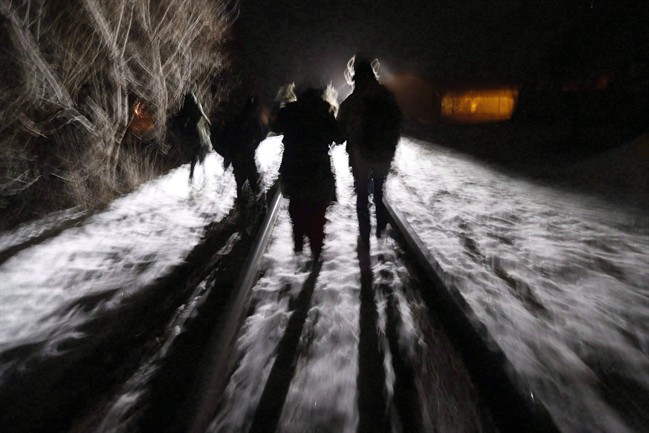The number of people intercepted by the RCMP last month as they attempted to cross the Canada-U.S. border irregularly was down slightly from the month before.

According to figures released this week by Citizenship and Immigration Canada, 1,517 people were stopped by the police as they crossed between legal checkpoints during what is typically Canada’s coldest month — January.
Of those, 1,458 came through in Quebec. The rest were split between Manitoba (18) and British Columbia (41).
READ MORE: Canada can’t deport illegal foreigners as countries are refusing to take them
That’s down from the 1,978 recorded in December, and lower than the 1,623 who crossed in November.
The lower number may give Ottawa cause for optimism that outreach in various diaspora communities in the U.S. is working — or at least helping to prevent another surge of people headed north.
But the numbers still haven’t dropped down to the levels seen last spring, and government officials have acknowledged that they could see another spike as the weather warms in the coming months and hundreds of thousands of people living in America face the expiry of their temporary protected status.

Get daily National news
WATCH: Immigration minister confident in review board process

In total, the RCMP intercepted 20,593 asylum seekers crossing into Canada last year between legal border checkpoints. Once all asylum seekers were factored in (including those claiming asylum inland or at legal crossings) the total was 49,775.
That’s the highest total seen in at least two decades.
By crossing between checkpoints, these people have been permitted to enter Canada and try to make an asylum claim — after being arrested, detained and undergoing security screening. If they crossed at legal checkpoints, the large majority would be sent back to the U.S. immediately under the Safe Third Country Agreement.
READ MORE: Mexico again among Canada’s top sources of refugee claims after visa requirement lifted
Immigration Minister Ahmed Hussen has said there are no talks underway with the U.S. to modify the agreement. The government has said repeatedly that there is “no free ticket to Canada” and that only a small percentage of the people who have crossed have been given the green light to make an asylum claim.
But critics contend that the system for evaluating and processing claims has been totally overwhelmed and that the government must close the loophole in the Safe Third Country Agreement to discourage further crossings.
- Tumbler Ridge B.C. mass shooting: What we know about the victims
- ‘We now have to figure out how to live life without her’: Mother of Tumbler Ridge shooting victim speaks
- Trump slams Canada as U.S. House passes symbolic vote to end tariffs
- Carney, federal party leaders to attend Tumbler Ridge shooting vigil Friday








Comments
Want to discuss? Please read our Commenting Policy first.